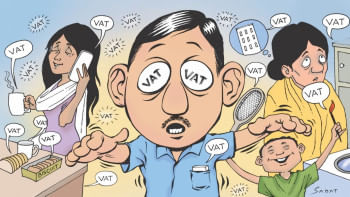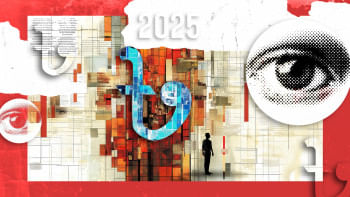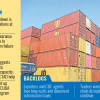Raising VAT and shrinking social protection are unwise moves

As the people of Bangladesh continue to struggle to make ends meet during a high inflationary period, two recent government decisions are considered to have worsened the situation. First, the interim government raised the value-added tax (VAT) and supplementary duty (SD) on more than 100 products and services on January 9 through two ordinances. Second, a programme of the Trading Corporation of Bangladesh (TCB), launched in October 2024 to sell oil, lentils, and rice in trucks to low-income people, has been cancelled.
The VAT and SD on a number of items have been raised substantially. For example, VAT on sweets, clothes, and restaurant meals has been raised by 7.5-15 percent—a 100 percent increase. In some cases, the increase is even 200 percent. VAT at the production stage and SD on imports like fruit juice and colours have also increased. SD on mobile phone service has been increased by three percent.
These changes in the middle of the fiscal year are unexpected and unwanted as the economy faces significant challenges, including high inflation, low investment, low job creation, and low economic growth. Several factors are responsible for low economic growth, including an already fragile economy left by the previous Awami League government, disruptions in economic activities during the July uprising, disturbances in the law-and-order situation following the ouster of the Awami League government on August 5, 2024, and a lack of confidence among domestic and external economic players.
The previous government did not take any meaningful measures to control inflation, which has been on the rise for nearly three years. The interim government is struggling to control high inflation as well. In December 2024, average inflation declined slightly, dropping to 10.89 percent from 11.38 percent of the previous month. Similarly, food inflation was 12.92 percent in December 2024, slightly lower than 13.80 percent in November 2024. However, both average and food inflation rates are still very high, as wages and salaries have not increased at the same rates. The monetary policy has been adequately tightened by increasing policy rates, but it has yet to impact the inflation. Besides, without supply-side management, inflationary pressure will not ease up. There should be ample supply in the market for consumers to buy at affordable prices. The government has to make enough procurement of essential agricultural products, including rice, at a just price from the farmers. It also has to import fast to stabilise the prices of essentials. Effective market management must be carried out to ensure the supply of commodities.
Understandably, the unexpected increase of VAT and SD is aimed at meeting the target of tax collection during FY2024-25 as set by the International Monetary Fund (IMF). Bangladesh borrowed $4.7 billion from the IMF in January 2023, agreeing to fulfil more than 30 major and minor conditionalities. One of the conditions is to raise the tax-GDP ratio by 0.5 percent each year till 2026. Unfortunately, the National Board of Revenue (NBR) has failed to fulfil its target set by the government in the national budget for about a decade. The NBR has to raise an additional Tk 12,000 crore in FY2024-25. It will be more difficult to fulfil the IMF target in the current fiscal year due to the recent political upheaval and economic instability. But the decision to fill the revenue gap by increasing VAT and SD is an inappropriate measure for several reasons.
First, this will increase the prices and fuel inflation further. Hence, the Bangladesh Bank's efforts to control inflation through contractionary monetary policy will take longer.
Second, VAT is an indirect tax passed on to consumers irrespective of their income status. Even though the government tried to explain that most of these items are not consumed by the poor and thus they will not be affected, in reality, everyone will be impacted in one way or another. Some items are essential, and people will have to buy even if prices go up. For example, people from all income strata need food and clothes. Of course, the government has reduced tariffs on several imported items to ease pressure on their prices. Unfortunately, the benefit of tariff reductions on imported goods is not passed on to consumers due to dishonest traders. The market management mechanism is very poor at reversing such unethical practices. So, the decision to increase VAT will further erode the purchasing power of fixed-income households.
Third, there is also a possibility that the goal to collect more revenue through increased VAT may not materialise. Due to economic hardship, people may reduce their purchases with increased VAT.
Fourth, the business community has also raised concerns about the negative impact of VAT and SD increases in the current situation. The interest rate on bank loans has gone up to about 15-16 percent as the policy rate has been increased to 10 percent. Businessmen have also complained about the gas crisis, extortions in goods transportation, and the fear of labour unrest. If the cost of doing business continues to rise, industrial production will decline, and export competitiveness may decline, having a negative impact on employment and economic growth.
Fifth, the government should have put forth its efforts to collect direct income taxes from tax evaders. Besides, the government could have also reviewed and restructured various tax exemptions given to institutions and businesses without much rationale. Streamlining the tax system can help collect more taxes and reduce NBR's dependency on indirect tax, which is regressive in nature. Over 65 percent of tax is collected from VAT. Such a tax structure must change to reduce inequality and establish tax justice in society. The weaknesses in collecting direct income tax have not been addressed by improving the efficiency of the tax administration till now. While reforming the tax system may take some time, immediate measures such as using technology to track tax evaders and enforcing strict tax compliance should have already been in place.
The second decision of the government—cancelling TCB's truck sale of some goods at subsidised prices—is also unwise and insensitive. It will further increase the hardship for low-income people. Another programme run by the Department of Agricultural Marketing since October 2024 to sell agricultural commodities from trucks at affordable prices has also been halted. These measures are worrying as they will exacerbate the difficulties of the poor and could push many families below the poverty level.
The ongoing fiscal year is challenging for both the government and the people. While individuals and businesses are trying to stretch their resilience through various cost-cutting measures, the government is also struggling to revive the shattered economy. However, its priority should be to give respite to people experiencing inflationary pressure. Unfortunately, the increase in VAT and the reduction of social protection measures will only increase people's suffering.
If economic and social realities are not factored into its decision-making process, the interim government will quickly become unpopular.
Dr Fahmida Khatun is executive director at the Centre for Policy Dialogue (CPD) and non-resident senior fellow at the Atlantic Council.
Views expressed in this article are the author's own.
Follow The Daily Star Opinion on Facebook for the latest opinions, commentaries and analyses by experts and professionals. To contribute your article or letter to The Daily Star Opinion, see our guidelines for submission.

 For all latest news, follow The Daily Star's Google News channel.
For all latest news, follow The Daily Star's Google News channel. 













Comments